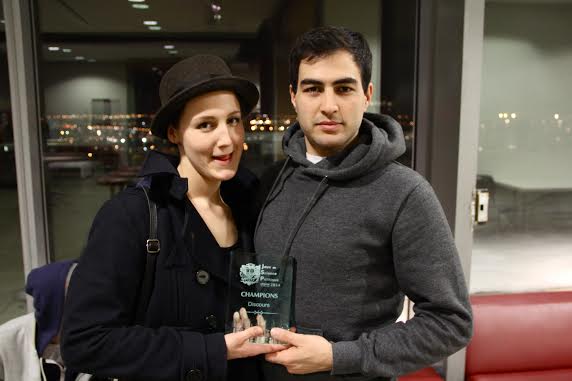The Political Science Student Association (PSSA) competed in the Jeux de la science politique (JDSP) at UQAM two weeks ago, placing first in the discourse competition and fifth overall.
The JDSP is an annual competition between Quebec universities founded to promote the discipline of political science, in a friendly and competitive spirit. This year it was held between six universities, including Sherbrooke, Laval, Montreal and Quebec. According to Concordia’s press release, the competition was divided into “different categories, including debate, case study, discourse, quiz and sports.”
The francophone inter-university competition was established by Laval University in 2011, according to Le Collectif. However, for three consecutive years Sherbrooke’s name has adorned the JDSP cup. This year, Laval University successfully dethroned the three-time victor and won the overall competition.
Concordia surprised everyone by winning the discourse event, the most central part of the competition, along with the debate event, and finished third in the academic case study, which was won by Université de Montréal.
The PSSA has struggled in the past during the discourse event. The discourse event requires competitors to deliver a speech as though they were a political figure. The event’s difficulty was increased this year when in addition to giving a speech and answering questions, competitors were asked to give a critical summary of a text by Michel Foucault. Jessica Lelièvre and Vasif Aliev, two political science students at Concordia and veterans of the JDSP, teamed up for this part of competition.
“I panicked at first, when I saw the text. It was my first time dealing with Foucault [but] I knew we were more prepared than last year, since we had the advice of professor Brooke Jeffrey,” said Lelièvre. “That helped a lot.”
The critical summary demanded stronger collaboration from the team than the speech and questions because the choice of author and topic required their complete focus.
“It’s something we do a lot at Concordia,” explained Lelièvre about the summary. “This is where we really showed our true strength, we had a very motivated team putting in the effort.”
Their team effort manifested itself into a solid victory as the group scored higher than all of their competitors in the discourse category.
“We [were awarded a] 97 per cent and the organizational committee told us the second university was 30 points below us, once we learned the final results,” said Lelièvre.
This first victory at the Jeux de Science Politiques allowed Concordia to move up in the overall scores of the competition.
“It’s great recognition, because we are facing five other universities from Quebec and Ontario,” said Lelièvre. “We are proving to other universities, departments, and faculties around the province that Concordia is ranking higher, showing its worth, and that we can compete and win.”
With files from Tim Weynerowski
The Jeux de Science on Facebook:
https://www.facebook.com/JeuxDeSciencePolitique2013Uqam/page_map





